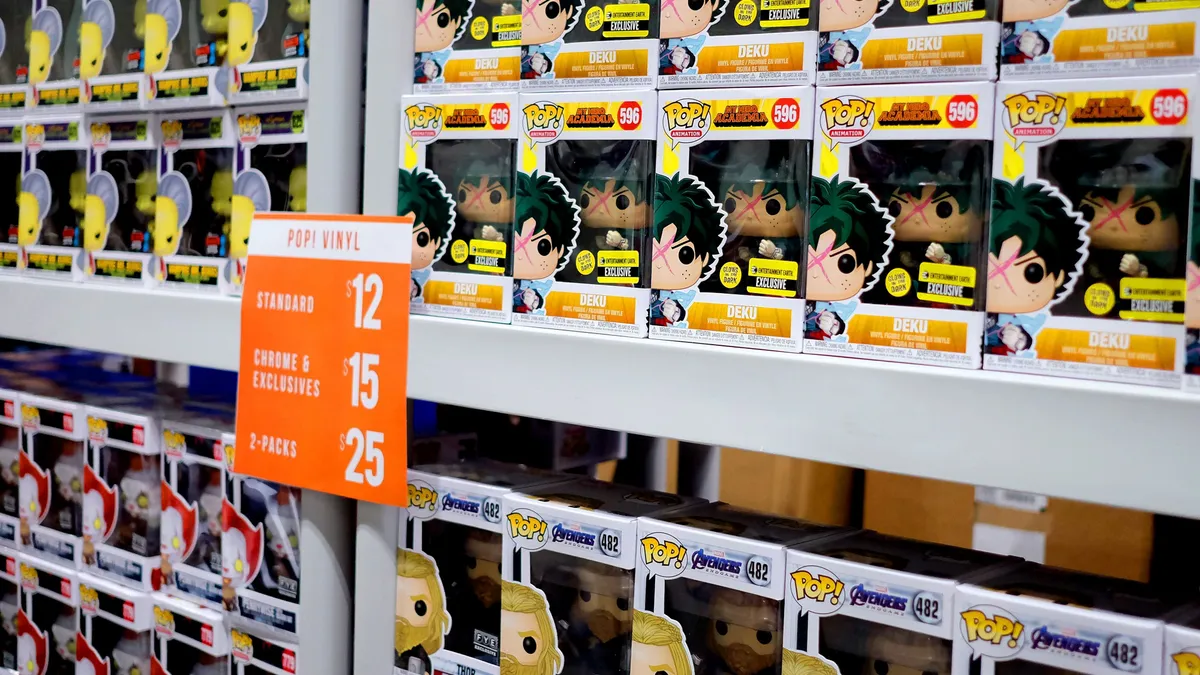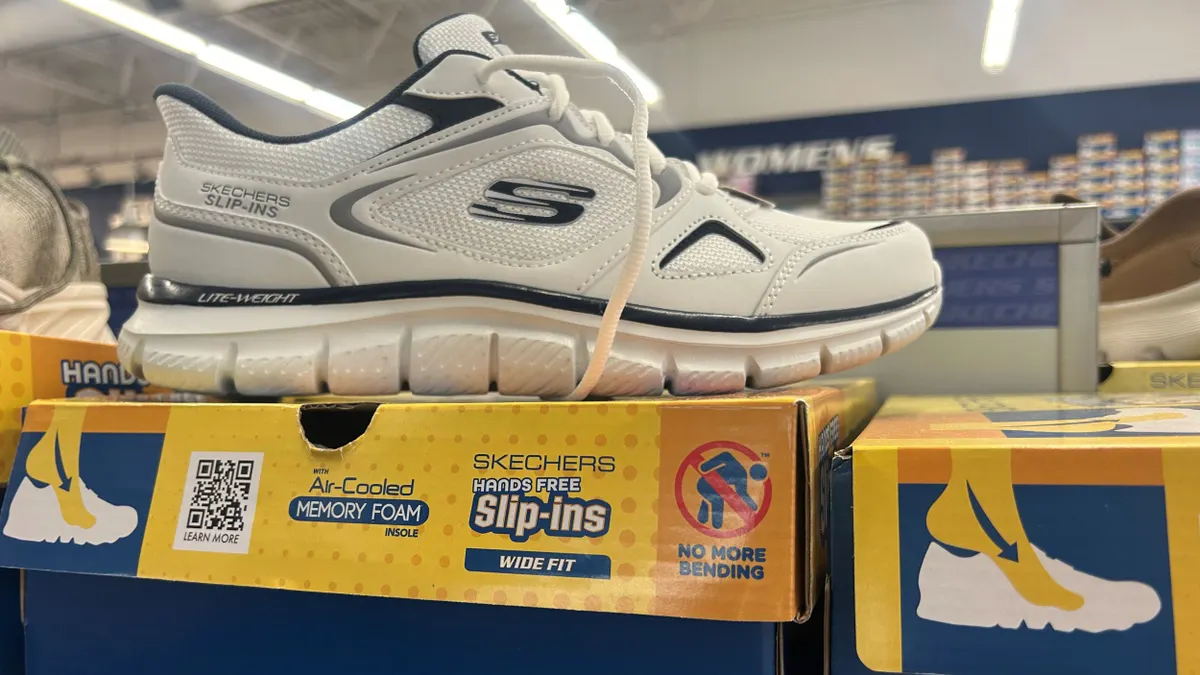If it weren't for the Beatles, Guitar Center might still be the Organ Center.
That was the name of the store Wayne Mitchell founded in 1959 in Hollywood, California. As the name suggested, it sold organs for the home along with small appliances. Rock and roll had been around for a few years by then but apparently hadn't completely displaced home music makers' taste for the baroque and churchly organ.
The Beatles helped change that forever, at Mitchell's store and elsewhere. "As Beatlemania washed onto American shores in 1964, and rock and roll took grip of Americans' collective consciousness, Mr. Mitchell recognized, and seized, an opportunity," Guitar Center Chief Financial Officer Tim Martin said in court papers. "The future of musical instrument retailing did not lay in organs. Americans wanted guitars."
Mitchell changed his store's name to "Vox Guitar Center," and revamped it as a purveyor of the specific brand favored by the Beatles. It would soon drop the "Vox" and transform itself into a big-box retailer of music equipment that would become the largest of its kind.
This weekend, Guitar Center filed for Chapter 11 bankruptcy after the COVID-19 crisis shredded its finances. The retailer has a plan to quickly restructure, add liquidity and exit roughly the same as it came, but with new money and $800 million less in debt. The filing comes after years of struggle under a debt load leftover from multiple private equity takeovers and in a market for guitars that has wavered with taste and preference changes, and has been altered perhaps forever by the pandemic.
'It's not like selling pet food'
Selling guitars is vastly different from most other retail enterprises. It is attached to a lifestyle, multiple subcultures, a tradition of making music that predates human civilization, and very often Beatles-sized dreams of fame and glory.
"It's not like selling a toy. It's not like selling pet food," said Chuck Surack, the CEO of online guitar seller Sweetwater in an interview. Sweetwater is the No. 2 musical instrument retailer after Guitar Center, according to Music Trades. "To be really successful, you have to know the products and have a passion for them."
Mitchell created Guitar Center with an eye for the subculture that produced rock and roll. "In sharp contrast to the staid and established music stores in Southern California, Guitar Center sought out musicians to sell its equipment to customers, and encouraged customers to 'touch, feel, play' the instruments at their leisure," Martin said. "Guitar Center was an experience — immersive and perfectly suited to the time."
Starting in the early 1970s, Guitar Center started expanding, first with more stores in California and then adding stores in Minneapolis, Dallas, Houston and Chicago. The stores featured high ceilings, the better to merchandise stores wall-to-wall with guitars.
Over the ensuing decades the retailer added hundreds of stores and acquired new businesses, including the mail-order and e-commerce retailer Musician's Friend, cataloger American Music Group and school band instrument specialist Music & Arts. After going public in 1997, in a decade of rapid growth, the retailer was taken private in a leveraged buyout by Bain Capital Partners and another investor.
That began a long struggle with debt that ultimately ends with Guitar Center's bankruptcy. It's a story that has played out many times in retail in the past decade. Debt leftover from a private equity acquisition becomes an albatross, weighing a retailer down while competitors and consumers rocket ahead with market and industry changes.
As a competitor, Surack could see the changes in Guitar Center's stores and business as it came under the ownership of investment firms. "There was a period when all their stores were inventoried well, and they had lots of brands and everything from a good-better-best sort of thing," Surack said. "And through the years, they've gone to more and more private label, less expensive brands." As that happened, the stores started carrying less inventory and less inventory of the name brands that many customers sought.
Just as important, if not more so, was staff attrition at Guitar Center since private equity firms took over. "They have laid off people that have just decades of history with them," Surack said. "They try and get rid of high salaries, and they fill their stores up with minimum wage people or close to minimum wage people who don't know the products, they don't stay very long. They're there until they get another gig, whether it's a playing gig or a gig in another industry."
'Wiped out' progress
In 2014, ownership changed hands after Ares Capital converted its equity to debt in a restructuring deal. Guitar Center refinanced its debt again in 2018 but essentially just kicked the can down the road without reducing its overall burden. Looming over the company during this year were maturities on some $1 billion in debt.
The pandemic picked away at the retailer's finances. Prior to the COVID-19 outbreak, Guitar Center reported 10 straight quarters of comparable sales growth. But Martin said the pandemic "wiped out" much of that progress.
Not every retailer in the music space suffered as Guitar Center did. Sales of guitars boomed for many as the U.S. isolated to fight the pandemic. Bored, stressed and lonely, many have looked to guitars and other instruments to fill time and do something a little more rewarding than binge-watching videos. The CEO of guitar-maker Fender told the New York Times his company had record sales this year, while the chief executive of Gibson Brands said his company was selling instruments as fast as they could make them.
At Sweetwater, which Surack said is the largest online retailer of instruments, sales "exploded," with year over year growth of 56% in the spring and with continuing growth of nearly 50% for the year so far. "People are staying at home, and they're just ordering stuff," Surack said. "People who've always wanted to play an instrument have said, 'Now I have time.'"
But for Guitar Center, with 500 brick-and-mortar stores across its banners, the pandemic was a catastrophe. Along with making sales through its stores, the retailer, under CEO Ron Japinga, had been working to turn its stores into "full-service music shops" that offer lessons, repairs and rentals along with guitars and accessories, according to Martin.
"This focus on the service sector of the music business, rather than just merchandise sales, increased margins, boosted customer engagement, and generated steady income streams," Martin said. "These services also served to help insulate Guitar Center from online only retailers."
Those additional revenue streams, however, also took a hit when Guitar Center had to close its stores in the initial spread of COVID-19. And while the retailer has e-commerce channels — which grew 130% while stores were closed, according to Martin — they weren't enough to plug the leak. Even with e-commerce sales on the rise, Guitar Center's total sales for the first half of the year fell by nearly 20% compared to 2019.
Prior to the pandemic, Guitar Center had been on "extraordinarily sound footing," according to Martin. After stores closed, the company became pressed for cash, even after furloughing more than half of its employees and cutting costs wherever it could.
By summer, the retailer had missed payments on a group of bonds as it faced a liquidity shortage. It cut a deal with debtholders, who gave it a break on current interest payments so Guitar Center could preserve cash, but analysts still expected the retailer would need to restructure again down the road. And then in November, an announcement of a restructuring — to be executed in Chapter 11 — came from Guitar Center.
Hopes for a comeback concert
Guitar Center enters bankruptcy with a plan and a deal. Ares as well as new investors The Carlyle Group and Brigade Capital Management are together putting up $165 million in new equity investments to support the retailer.
Moreover, "supermajorities" of lenders have signed on to a plan to eliminate some $800 million in debt, although that still leaves a not-insignificant chunk left given Guitar Center's total load of $1.3 billion in funded debt. The retailer also has bankruptcy funding lined up and plans to issue $375 million in new bonds to help fund it through Chapter 11 and beyond.
If all goes according to plan, Guitar Center will be out of bankruptcy by the end of the year, and with roughly the same footprint it entered with. (The company has engaged real estate advisers to evaluate its portfolio but has said it is "pleased" with its store footprint.)
All of that points to support for the company from its key stakeholders, who are willing to put up money to keep the company alive and rockin' beyond Chapter 11. Japinga has said that after the in-court restructuring, Guitar Center will be "better equipped to execute on and invest in our strategic growth initiatives."
And that's a good thing, according to Guitar Center's biggest competitor.
"I did not, do not want Guitar Center to go bankrupt," Surack said. "They're good for our industry, even though they're not as good as they used to be. Our industry needs them badly. They need to inspire young people to come in and learn how to play an instrument. And that's something they did pretty well."





















